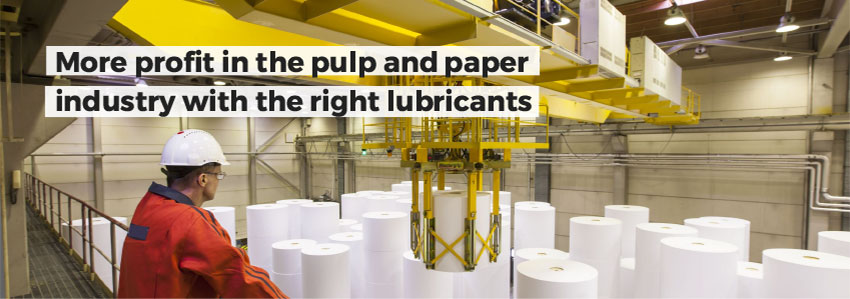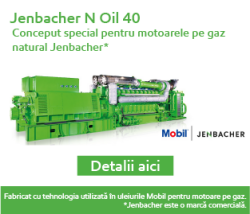More profit in the pulp and paper industry with the right lubricants
 More profit in the pulp and paper industry with the right lubricants
More profit in the pulp and paper industry with the right lubricants
The pulp and paper industry has a very important role in our current society, as it provides the necessary materials useful in many fields, such as stationery, clothing industry, medical industry or cosmetics industry.
Although the pulp and paper seem like materials simple to obtain, their manufacturing process is complex and involves the use of special equipment and mechanisms. For a profitable and efficient production, the manufacturing process must be simple and safe. Reaching a high performance level is possible only when the equipment used is correctly maintained.
Proper maintenance of equipment in the pulp and paper industry
Swiveling cranes, auxiliary cranes, machines for hoisting, cutting or corrugating the paper, mixers reducers are just some of the necessary equipment in pulp and paper production. Their maintenance is very important because it can determine their durability and efficiency, especially since they operate most often in wet and corrosive environments. Therefore, it is better to follow the advice of specialists and those of the manufacturers when it comes to maintenance.
-
Checking the mechanisms is an action that must be done daily, regardless of the workload. They must operate within normal parameters and any anomaly should be removed as soon as it appears.
-
Implementing a maintenance strategy can reduce downtime during failures, as well as maintenance costs. When the equipment maintenance is not performed within regular intervals, the products used are unconsciously wasted and the wear and change of some costly parts become inevitable. In contrast, when there is a strict lubrication program and a maintenance plan complied with by all employees, the equipment durability increases, downtime decreases and the need to change important parts will appear less often.
-
Using the right lubricants is one of the most important factors in this process. Viscosity, density and composition are crucial elements that determine the quality of oils used. When using lubricants not viscous enough, you risk facing the same problems constantly. Instead, the use of high-quality synthetic industrial lubricants, with properties favorable to the protection and durability of mechanisms and motors, can increase the performance and productivity in your factory.
Why you should use high-quality synthetic lubricants?
Synthetic lubricants are designed to protect against wear, rust occurrence, excessive vibration and many other hazards, depending on the equipment. They must be compatible with the equipment used, which is why the recommendation of the manufacturer or a specialist in industrial lubricants is essential. Numerous examples of performant lubricants are given by the Mobil industrial lubricants, whose performance has been proven in the pulp and paper industry.
Here are some examples where the right lubricant contributed to the success and profitability of the businesses in the pulp and paper industry:
-
1. Lowering the operation temperature and $9,500 savings
A paper company in Thailand owning two Allimand machines was faced with excessive wear in high temperature conditions. The main causes of wear were represented by temperatures up to 70 degrees Celsius and the oxidation of the lubricants used. The company was forced to perform oil changes once every three months.
After an analysis of the needs of the equipment used, the product recommended by the ExxonMobil experts was Mobil SHC 630. In the following two and a half years, the Thai company concluded that the product was the best option as the operating temperature of the equipment dropped to 50 degrees, the oil change interval went up to 24 months, and the maintenance costs decreased by $9,500 annually.
-
2. Decreasing the used energy and reducing excessive vibration
A company producing paper napkins was experiencing excessive vibration which led in time to severe damage of the equipment transmission. The lack of a viscous liquid in the loaded areas of the equipment during the friction action led to noise and excessive vibration. Also, the efficiency of the mechanism was minimal in these conditions.
The recommended product in this situation was Mobil SHC Gear 200. The excessive vibration which led to failures disappeared soon thanks to the use of an oil with a higher mineral content. Also, the company recorded a 7% decrease in electricity consumption.
-
3. Reduced wear and 3,500 EUR savings
A Dutch company from the paper industry was using equipment that needed lubrication once every 6 weeks. Due to poor quality lubrication, the wear could be easily observed and the level of vibration and the frequent faults were obvious symptoms of the fact that the maintenance process needed improvement.
The field engineer recommended the company to use a more viscous lubricant, which would extend oil change interval and would reduce vibration. After switching to the recommended oil, the oil change became necessary once every 18 weeks, the interaction of employees with the equipment was reduced by 58 hours and the maintenance costs dropped by 3,500 euros.
Do you need a better solution for the lubrication of equipment in the pulp and paper industry? Click on the image below and request more information from the Star Lubricants specialists. They will help you choose the right lubricant that will bring you similar results to those presented above.
The results presented in this material are based on the particular experience of the clients. They may vary depending on the type of vehicle used and on its maintenance, on its operating conditions and environment, as well as on the previously used lubricant.







